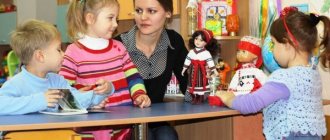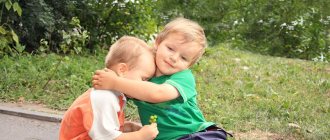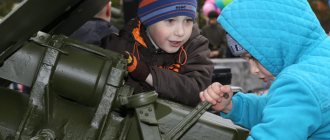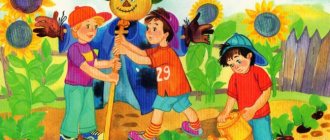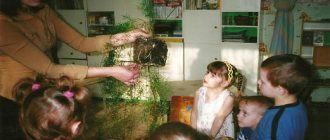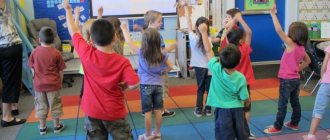When to start developing the moral qualities of a person
There is an opinion that a person’s character is formed before the age of 5 - the rest of the time it can only be adjusted. Yes, the foundation of personality is laid in early childhood, but under the influence of the immediate environment, a person’s moral qualities can undergo changes throughout his life. Another statement: how well a child is raised depends on his future fate, the opportunity to find his place in life, and the ability to become happy.
By the age of 5, a child, as a rule, is already able to evaluate his actions, separate good behavior from bad, and control his emotions.
A child will not be able to develop the necessary moral qualities and behavioral skills without the direct participation of significant adults in this process. That is, the child must be taught all this, just like counting or tying shoelaces. The closest people to preschool children, as a rule, are parents and teachers.
Spiritual and moral education of preschool children - Teplova A.B. / Educators of Russia
Spiritual reading
1. You should read the Gospel daily. Since ancient times, teaching the basics of faith has been the responsibility of the father. It is advisable to make this a nightly tradition. Nowadays, there are many manuals for the religious education of children.
2. It is also useful to read the lives of saints, adapted for children. The child should not be a passive listener; after reading, he should discuss what he read and ask questions. It is important to show the saints not as legendary heroes of bygone times, but as our eternal mentors and helpers to whom we can turn. Show what was most important in the lives of all these great people.
3. A useful tradition for children and adults is to daily write out and memorize a verse that touched the heart from a chapter of the Gospel read.
Stages of child moral development
Parents, educators and peers play a critical role in the development of spiritual and moral qualities, which at their core are a set of rules and expectations that determine behavior. At different stages of their development, children have different values, different points of view, and many connections that influence their moral development.
- Stage of punishment and submission. In the early stages of moral development, children are driven by the desire to avoid punishment and satisfy their needs through obedience to rules and simple choices between right and wrong.
- Stage of justice and equality. At this stage of development, children become selfish; they strive to satisfy their needs before others. Very rarely do children meet the needs of others.
- Stage of expectations and rules. With experience and help from adults, children progress to the next stage of moral development, where individual morality is shaped by interpersonal norms and the expectations of others (such as peers, teachers, and parents).
- Law and order stage. At this stage of development, behavior is characterized by obedience to the law, respect for persons in authority, and adherence to social rules and norms.
- Social contract stage. Outside of traditional ideas, appropriate behavior is based on social norms, rules and laws. However, care must be taken to ensure that individual values are not violated and that fairness is maintained.
- Stage of universal and ethical principles. Although behavior is often governed by rules, laws, and expectations, there are exceptional circumstances where independent judgment and moral reasoning may trump conventional norms in the decision-making process.
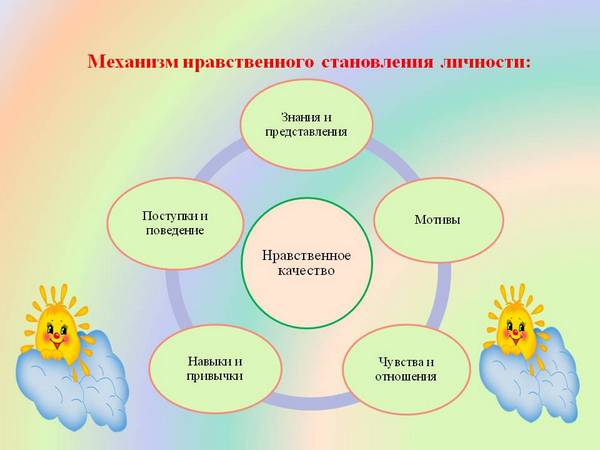
Tasks of moral education of preschool children
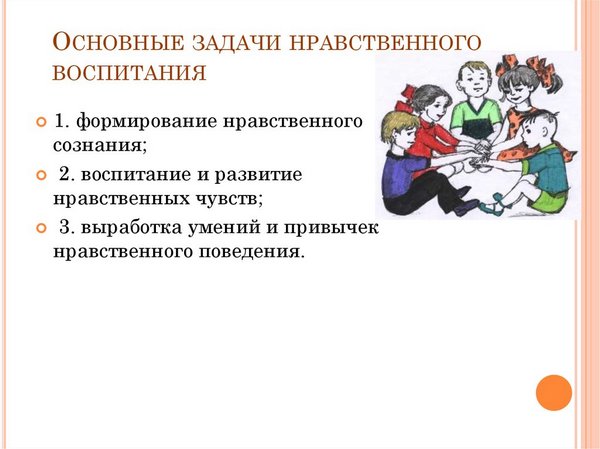
The spiritual and moral education of preschool children is based on several important “pillars”:
- a life principle built on goodness, the absence of sinfulness and evil;
- humane attitude towards friends and strangers;
- development of cultural skills;
- growth and harmonious development of the child as an individual.
Each of the principles involves specific work with the baby. So, in the first case, good fairy tales or Orthodox parables that children can understand, in which good certainly triumphs over evil, will help convey the necessary information.
Unobtrusive conversations, stories and examples from life will teach you to treat others humanely.
You can cultivate a craving for cultural values by first visiting nature museums with your child, and then galleries and exhibitions. If you don’t have the necessary knowledge yourself, you can take a guide who, taking into account your age, will tell you about the exhibits in an interesting and fascinating way.
Moral education of children using Russian folk tales and Soviet animation
How to cultivate spiritual and moral qualities, examples and recommendations
Personal example
It is known that the best method of education is personal example. Any words lose their meaning if they are not used in practice. No matter how much parents and educators talk about good behavior, respect for others and a humane attitude towards nature, if adults do not do what they talk about, then all the talk will be in vain.
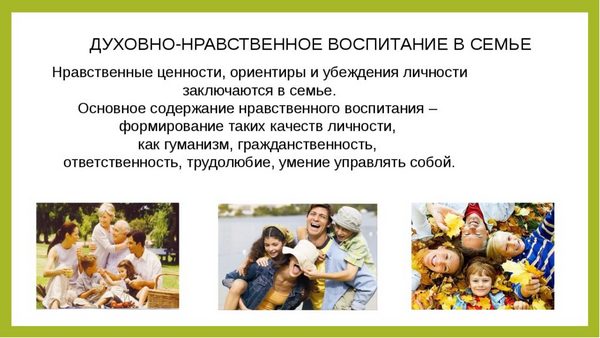
For example, if dad declares that one must love animals, but he kicks away a stray kitten, then this is unlikely to be a worthy example to follow. If a mother communicates with her neighbor in the most kind way, but gives unflattering assessments behind her back, then her daughter is more likely to learn a lesson in hypocrisy and double-mindedness than a sincere attitude towards loved ones.
Moral education of preschoolers is not an easy task, and in order for your child to grow up to be a worthy person, he must copy your appropriate behavior.
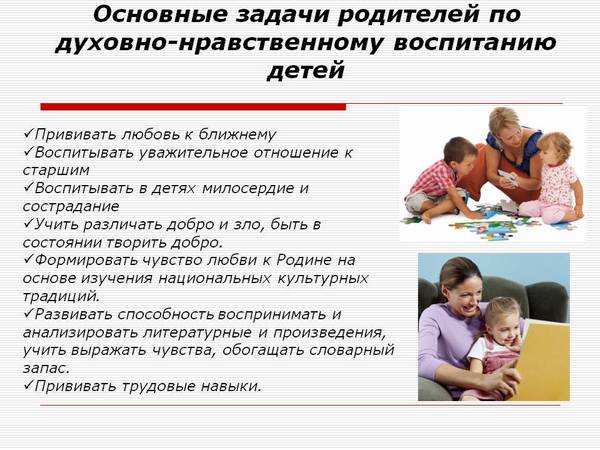
Ability to share
It is extremely difficult for small children to understand why he should give, even temporarily, his favorite toy to a boy in the sandbox. The child still has no idea what generosity is, what greed is, and you shouldn’t reprimand him for it. You need to simply and unobtrusively tell how great it is when you can please another person - then you yourself will be happier, how great it is when you love not only receiving gifts, but also giving them.
A little later, the topic of “know how to share” can be expanded. Children learn that they can share not only objects, toys, and treats, but also a warm attitude, a good mood, and a smile. It is appropriate to recall the wonderful song about a smile from the cartoon.
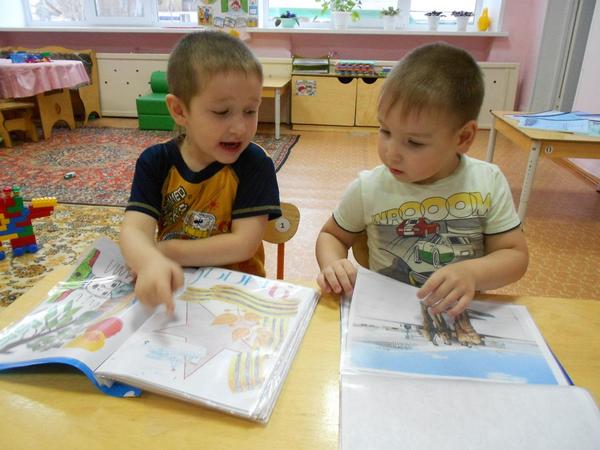
Caring for others
It is also easier and more effective to cultivate such moral qualities as kindness and responsiveness through personal example. When children see that mom and dad love not only them, but also a disabled neighbor on the playground, that they are not capable of offending not only a person, but any living creature either by word or action, you can be sure that the kids will absorb into themselves this behavior.
At an early age, the spiritual and moral education of children through fairy tales is of invaluable importance. In particular, K.D.’s fairy tales vividly teach us to take care of others. Ushinsky “Know how to wait”, Russian folk song about a cockerel, a chicken and a bean seed, etc.
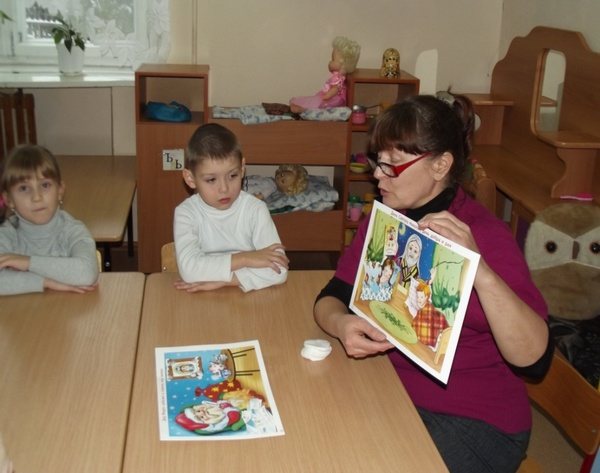
We learn the main ethical standards of a kindergartener
When already preparing your child for his first visit to kindergarten, you can teach a small but clear lesson on the topic “moral education of preschool children.”
It is possible that the child will have to face the fact that other guys are fighting.
- We need to explain to him that it is absolutely forbidden to offend other people, and especially beat them.
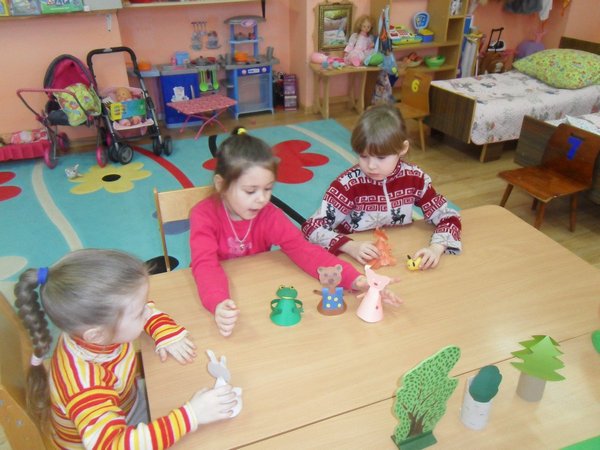
This first “no” leads to the second, which indirectly continues the first:
- You cannot spoil, tear, or break books or toys. They were made by people. Human labor was spent on them. By spoiling a thing, you will offend a person and disrespect his work.
- The little man must remember the third “no” for the rest of his life: taking someone else’s property without permission is theft.
These three “don’ts” ultimately turn into an undeniable truth: you cannot grow up to be a good person if you violate them.
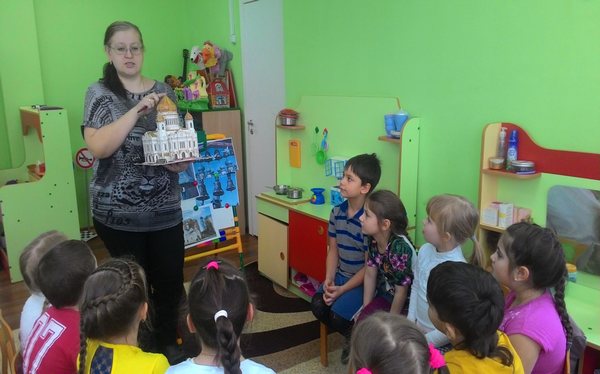
Consultation on the topic: “Spiritual education of preschool children in the modern world”
Spiritual and moral education of preschool children based on folklore and family traditions
Preschool age is the foundation of a child’s overall development, the starting period of all high human principles. Preserve the humanity in our children, lay moral foundations that will make them more resistant to unwanted influences; teach them the rules of communication, the ability to live among people - the main ideas of cultivating the spiritual and moral qualities of an individual.
The education of moral values is the most important indicator of a holistic personality, truly independent and responsible, capable of creating their own idea of their future life path. Many moral qualities of a person are laid down in childhood. Children of this age are very inquisitive, responsive, receptive, they easily respond to all initiatives, sincerely sympathize and empathize.
Intuitively, our children distinguish good from evil, understand the value of compassion and mercy, and value truth and honesty. But do we sufficiently support the best manifestations of our souls in them? Do we pay enough attention to considering life situations and actions, do we help children understand real life problems that require decision-making?
In our kindergarten, a lot of work is done to educate children’s spiritual and moral qualities, but there is no doubt that the foundations of spiritual morality in children of early and preschool age are laid in the family.
Family is the first step in a person’s life. She directs the consciousness, will, and feelings of children from an early age. A lot depends on what the traditions are in the family, what place the child occupies in the family, what the educational line of the family members is towards him.
Spiritual and moral education in a traditional Russian family has historically been based on traditional forms of the Orthodox family structure, namely:
- family life in accordance with the annual cycle of traditional holidays, general work and prayer life;
- caring for young children (long-term breastfeeding, foster care), caring for elderly family members;
- respect and mutual respect between spouses;
- use in education of oral and visual folk art, folklore games of joint production of homemade toys;
— feasible participation of children in the family’s work activities;
- shared family meal;
- family reading followed by discussion of what was read;
- the existence of a family council with the final word of the eldest family member;
- spiritual leadership of the family by a priest;
— mutual respect and mutual responsibility of all family members.
Today, the transmission of family traditions of upbringing is difficult; adult children live less and less often with their parents, often living in different cities. Children's education often exceeds that of their parents, which contributes to unfounded skepticism towards parental advice, including in the field of education. A preschooler child needs an ideal norm, enduring role models and a spiritual absolute. But where and how to “get smart” to become good parents yourself? Is it possible to revive family traditions, and in what form?
The first step in the development of spiritual morality in children is the continuity of kindergarten and family. The leading principle of spiritual and moral education is the constant friendly creative interaction of the teaching staff, children and parents. It is necessary to actively cooperate with the parents of students to form the spiritual and moral foundations of the family, organizing parent meetings, round table discussions, surveys, and debates. Increasing the prestige of motherhood and fatherhood, photo exhibitions and craft competitions “Dad can do anything”, “Mom’s hands know no boredom” (showing the skill, creativity, and hard work of parents) are necessary.
In sports relay races “Dad, Mom, I – a sports family” to promote a healthy lifestyle
Modern pedagogy recognizes the reality of the spiritual basis of man and the reality of the spiritual world. The practice of spiritual and moral education shows that a person’s spiritual life cannot be organized through the development of his psychophysical functions. You cannot come to the spiritual only through the development of the intellect, will or feelings, although spiritual life is mediated by mental, spiritual development. There is a need for purposeful spiritual and moral upbringing and education that restores the integrity of a person, presupposing the development of all his strengths and aspects, observing the hierarchical principle of human structure. This task as a whole can be solved only through the joint efforts of the family and educational institutions.
Enter the site
Nurturing spiritual and moral culture among preschool children
Spiritual and moral education
children is one of the main tasks
of a preschool
educational institution.
It is aimed at the assimilation by younger generations and the translation into practical action and behavior of higher spiritual values
, such as human life, family traditions, and behavior in society.
Preschool education
is a very important period in
the spiritual
and moral development of the individual, which is why the child must be introduced to moral standards of behavior in the process of various activities from an early age.
“The ultimate goal of reasonable education
of children is the gradual formation in the child of a clear understanding of the things of the world around him. Then the result of understanding should be the elevation of the good instincts of children’s nature into a conscious striving for the ideals of goodness and truth and, finally, the gradual formation of firm and free will,” wrote N. I. Pirogov. [1]
Our main goal is to educate the individual
striving for
spiritual growth
, kindness, capable of resisting evil.
Spiritual and moral education
is built in accordance with the values, norms and characteristics of the national
culture
, taking into account the traditions of its region and
the perception capabilities of the preschooler
, and in the process of such
education
the main task of the teacher is to select from the many impressions received by the child those that are most accessible to him and help develop positive qualities based on his
perception
: nature and the animal world, people’s work, traditions, social events - the foundations of such emotional
education of the individual and the perception of
individual elements
of spiritual and moral culture
are laid in early childhood and already at this stage of development should be supported by support from
kindergarten teachers
, as well as parents
of pupils
.
A child’s acquaintance with native traditions and norms can begin with fiction. By introducing children to sayings, riddles, proverbs, and fairy tales, they are thereby introduced to universal moral values. [4] A special place in works of oral folk art is occupied by a respectful attitude towards a healthy lifestyle and work. Thanks to this, folklore works are the richest source of spiritual
and moral development of children.
You need to attract the attention of children with bright images that arouse interest, and in proverbs and sayings, various life positions are rather briefly and vividly assessed, positive qualities are praised, and shortcomings are ridiculed. Folklore works contain a whole range of well-thought-out recommendations that express the people's idea of a person, the formation of personality, and spiritual and moral education
.
A very important part of the spiritual and moral education of preschool children
is careful handling of toys.
You can “invite the dolls to visit”
and take care of them.
Or help the bear pick raspberries in the forest, and then “make jam”
from plasticine or even in the form of crafts and drawings.
Such games encourage children to take active action; they already perceive
the toy as an object of care and support.
These qualities are very important in communication with others and should be cultivated from a very early age
.
After playing, be sure to put the play area in order - put all the dolls in beds or at tables, toys on their shelves. You can even arrange a kind of relay race for children “Put the toys in their place”
. You can even, as a game, run from one end of the room to the other to put toys in a box or special chest. It is very important to praise the child with every success in order to consolidate a good result and develop positive emotions in children to reinforce correct behavior in their minds. In this way, you show that you value the child and notice his efforts; this also has a positive effect on the formation of the baby’s character. [5]
However, all methods of education
must be systematized and applied in a comprehensive manner; one cannot limit oneself to literature or individual exercises.
When starting work on the spiritual and moral education of a child’s personality
, the teacher is first of all obliged to set a worthy personal example, think through what is more appropriate to show and tell children, create certain situations for moral choice, and be able to give competent explanations, because the environment has a colossal influence on value values. personality orientation.
The content of such education
consists of genuine life situations or situations that are described in a work of art, the behavior of people around them and the children themselves.
[7] During these conversations, the teacher
or the children themselves characterize facts and actions of a moral nature. Such characteristics form in children objectivity in assessing events, help them navigate a given situation and act in accordance with the rules of moral behavior. We need to try to involve kids in active actions and talk through all the manipulations together so that the children actively participate: move, fantasize. In this way, stable ideas about the world are formed quite clearly and at the same time the child’s active vocabulary is enriched.
Thus, the moral education of preschool children
age is considered in two aspects: this is the process of forming moral and
spiritual
social relations and personal qualities that allow these relationships to be carried out, and the purposeful activity
of the teacher
to form moral ideas in children, enrich their moral feelings, instill norms and rules of moral behavior that determine the child’s attitude towards yourself, other people, nature, things, etc. The effectiveness
of preschool education
largely depends on the correct choice of means and methods of pedagogical work with children and on the interaction of the kindergarten with parents.
Our goal is to educate a spiritually
and morally integral personality, taking into account the age of the child, because a large role in this belongs to
preschool institutions
,
educators
, and all
educational
work of preschool educational institutions should be built not only on the basis of psychological and pedagogical knowledge, but also
spiritual values
.
Spiritual and moral development and upbringing of children: formation of family values and family culture
Preschool age is a time for educating the soul
, and not the education of the child...
The spiritual and moral education
of preschool children is, first of all,
the education
of feelings towards the people closest to them: parents, brothers, sisters,
kindergarten teachers
, group children, the Motherland.
The priority role of the family in the formation
The child’s personality is clearly indicated in legislative documents at the international and domestic levels: in the Convention on the Rights of the Child, the Constitution of the Russian Federation, the Law
“On Education”
,
the Family Code
.
These documents establish the primary right of parents to raise children
, and outline the role of other social institutions that are designed to help, support, guide, and complement
the educational activities of the family
.
But today it is no secret that not all parents have sufficient general and spiritual culture
and the necessary pedagogical knowledge.
Modern families are very diverse, and this determines what kind of personal development environment surrounds the child
, what content is filled with
intra-family relationships
.
The quality of the family itself has also changed, and the continuity of the pedagogical tradition has been interrupted. Parents often show illiteracy in matters of development and education
.
The causes of family
problems are not only social difficulties, but also an unfavorable psychological climate, inability to build
family relationships
, causing significant harm
to the spiritual and psychological development
of the child’s personality.
Moral ideas about marriage and family have been violated, traditional perceptions
of parenthood and childhood have been lost.
The family is a system that has the features of a social institution and a small social group. For a preschooler, the family is the first social environment. It is the family that was, is and will always be the most important formation
personality and the main institution
of education
.
Currently, almost every domestic regulatory document actively declares the need for close cooperation between public education and the family, and psychological and pedagogical education of parents.
Such attention to the problem is explained by the socio-economic transformations in Russia, which could not but affect the education system. With the growth of scientific knowledge in the field of pedagogy and psychology, the requirements for education
and training the younger generation.
In connection with the enrichment of science with new knowledge about raising a child
, about the role of the family in his personal development, the problem of increasing the psychological and pedagogical
culture
of parents has acquired a new meaning and required deep comprehensive development.
A problem for many modern families
is the devaluation of a time-honored concept like
family values
.
This leads to a decline in the social prestige of the family and the dehumanization of society as a whole. As a result, childhood problems associated with violations in the formation of the moral and spiritual
sphere of the younger generation are noted.
The main documents devoted to issues of Russian education, as well as research in recent years, indicate such ways out of the current situation as:
value of marriage in the public consciousness
, the prestige of motherhood and fatherhood;
• revival of domestic cultural
- historical traditions.
According to the content of the Federal State Educational Standards of the Russian Federation and the requirements of the time, one of the leading priorities of education is the creation of conditions for the spiritual and moral education of children
.
Acquired social values
, social requirements, norms and ideals become the internal property of the individual, which ensures successful adaptation in the modern
sociocultural space
.
A preschooler, first of all, must recognize himself as a member of the family, an integral part of his small homeland, then as a citizen of Russia, and only then as an inhabitant of planet Earth. You need to go from near to far. Bring up
A child must love his home, family, and kindergarten from the first years of his life. The child must understand that having his own home is a great blessing. All good things begin with the home and mother - the keeper of the hearth. Children must learn not only to take, but also to give: to take care of loved ones from childhood, to be attentive to each other, to be compassionate, to help in word and deed. It all starts with family.
Family
traditions and home rituals are
much more important for children
than for adults.
But for some reason, traditions seem to us to be something global, something distant, occurring either at the state or at the national level. Maybe that’s why our question: “What family traditions do you have in your family?”
most parents just shrugged their shoulders and confidently answered that there simply weren’t any.
Meanwhile, psychologists assure that family
traditions are extremely important for children: with regularly repeating events, children come to feel a sense of stability in the world;
The connection between generations and warm, tender relationships between parents and matured children are preserved and strengthened. the loss of family
traditions as the cause of even problematic adolescence. Family is not only a common life, budget and relationships between family members. This is a special spirit, unique comfort and atmosphere, characteristic only for your family.
The meaning of rituals and home traditions is precisely that events follow one another in a once established sequence: day after day, month after month, and that they are observed no matter what. Confidence in this brings a sense of stability to a child’s life, relieves anxiety and consoles in moments of distress. The seriousness and respect that adults attribute to the child’s habits, which they themselves created, contribute to the development
The preschooler has a sense of self-worth. The baby learns to respect his words and promises, to be consistent, and to keep his word.
How a child subsequently treats himself, others and life in general depends entirely on the parents. Life may seem to him like an endless holiday or an exciting journey, or he may see it as boring, thankless and hard work that awaits everyone right outside the kindergarten gates. If most of the usual family
rituals do not bring restrictions, but only joy and pleasure; this strengthens in children a sense of family integrity, a sense of the uniqueness of their own home and confidence in the future.
That charge of inner warmth and optimism that each of us carries within us is acquired in childhood, and the greater it is, the better. Of course, a child’s character is not formed in one day
, but we can say with confidence: the more childhood was like a holiday, and the more joy there is in it, the happier the little man will be in the future.
Thus, the family is an institution of primary socialization. It is in the family that an individual gains his first life experience, makes his first observations and learns to behave in various situations.
Kindergarten is part of the system of indirect, or formal
, the child’s environment and represents an institution of secondary socialization. All stages of the socialization process are closely interconnected.
Unity in raising children
ensures the development of correct behavior
in children
, accelerates the process of mastering skills, knowledge and abilities, and contributes to the growth of the authority of adults - parents and
educators in the eyes of the child
. The basis of such unity is the pedagogical knowledge of parents, their awareness of the work of preschool institutions.
Cooperation between an educational institution and a family is one of the most important tasks of a child’s socialization in society. It is necessary to create such conditions so that the child, based on examples from experience, develops an awareness and understanding of what is good and what is bad, so that he can independently form
and have ideas about moral qualities.
The purpose of my work is to form family values and culture
family - achieving the following results:
1. Initial ideas about the Motherland and family, good and evil, generosity and greed, love, obedience, benevolence and envy, loyalty and betrayal, mercy, sensitivity, conscience, gratitude, hard work, etc.
2. Moral needs, aspirations, feelings:
- active manifestation of a feeling of love and respect for family and friends: the desire to do something pleasant for them, to please elders with one’s behavior, caring, attention; feeling of gratitude and appreciation;
- a feeling of goodwill to others (friendliness, willingness to be helpful, to show care, sympathy when upset, joy for the success of others, the desire not to judge other children poorly;
- love for one’s Fatherland, interest in one’s land;
- a feeling of sympathy for people regardless of their nationality;
— familiarization with the experience of national culture
, acquaintance with
the forms of traditional family life
, understanding one’s place in the family and participating in household chores as much as possible;
- responsibility for one’s deeds and actions,
— the need and willingness to show compassion and co-joy;
— subjective psycho-emotional well-being;
3. Moral skills and habits:
- follow the tradition of celebrating name days;
- show attention and care to the elderly, sick, and younger;
- analyze your own behavior in a situation of moral choice;
- treat people who have made a mistake fairly, without blaming or condemning them;
- behave in an orderly manner in public places (give way to adults, small children; observe the rules of decency, speak quietly, without attracting attention to yourself, do not disturb others, maintain neatness);
- in a friendly and friendly manner
turn to peers with a request to play together, respond to a friend’s request to take him into the game, be attentive to the suggestions of another child when performing joint activities, agree with the plan proposed by a peer;
- tactfully express refusal to participate in common activities, politely respond to another child’s refusal;
- the habit of doing everything you can yourself, without requiring the help of others;
- careful attitude towards the work of adults and comrades, towards things, maintaining order and cleanliness; active attitude to work.
This attitude towards the fundamental concepts of our lives continues to develop
and further as they grow older.
The child’s main assistant on this path is an adult, who, through concrete examples of his behavior, instills in the child the basic moral standards of behavior. If examples from the experience of a child and his close circle are negative, then one
cannot to develop
Moral education in kindergarten
Preschool institutions, without a doubt, along with parents, play an important role in the spiritual and moral development of children.
Classes in kindergarten include not only the acquisition of any knowledge in theory, but also its application in practice. Children from a young age get used to discipline, learn to distinguish between play time, when they can make noise and relax, and school time, when they should be quiet and listen carefully to the teacher.
The experience of some of them is interesting, when educators actively involve the families of their pets in spiritual and moral education in preschool educational institutions. In some places there are so-called schools for young parents, with the help of which educational walks in the immediate surroundings are carried out. Children, together with adults in particular, learn what their native land is, how it should be loved and taken care of.
When such general parent-child events take place, fathers and mothers get the opportunity to see their child as if from the outside, in a situation unfamiliar to them, and see whether it is worth paying special attention to something in the home educational process.
Prayer
1. The day of all family members begins and ends with prayer. For children, the rule may consist of several short prayers, for example the so-called. “the usual beginning” (morning prayers and prayers for those to come begin with it) in any prayer book.
2. Prayer before and after meals is a powerful means of spiritual education.
3. Before breakfast, it is customary to eat a small piece of prosphora (it can be purchased at the church and cut) and holy water (you can always get it at the church) with the prayer “For the acceptance of the prosphora and holy water.”
4. When a child leaves the house (and also before going to bed), he needs to be crossed with prayer. For example, this: “Lord, bless” or “Protect (the name of the child), Lord, by the power of Your Honest and Life-giving Cross and save him from all evil.” Or: “Lord Jesus Christ, Son of God, bless, sanctify, preserve by the power of Your life-giving Cross”; If you have an obstinate teenager, then you can do it after him, so that he does not see.
5. Don't impose a big prayer rule on your child. When teaching prayer, attention and sincerity are especially important.
6. It makes sense to add prayers to the prayer rule depending on the circumstances: holidays, a holy day, fasting, someone’s illness, some joyful or sad event.
7. When praying at home, light a candle or lamp; it is advisable that this be the child’s responsibility.
8. Do not pray late, when the child dreams only of sleep and his attention is relaxed.
9. The child should be taught short prayers: “Lord bless”, “Glory to Thee, Lord”, “Lord have mercy”, “Most Holy Theotokos, save us”, “Glory to God for everything”; “Lord, bless me for my studies” (sincerely, not automatically).
10. Help your child make a memorial. All the names there should be written only by himself according to his own heart, because this is his memorial.
11. There should be icons in the child’s room (as well as in other rooms and the dining room). The main and larger icon should be the icon of the Savior or the Holy Trinity.
